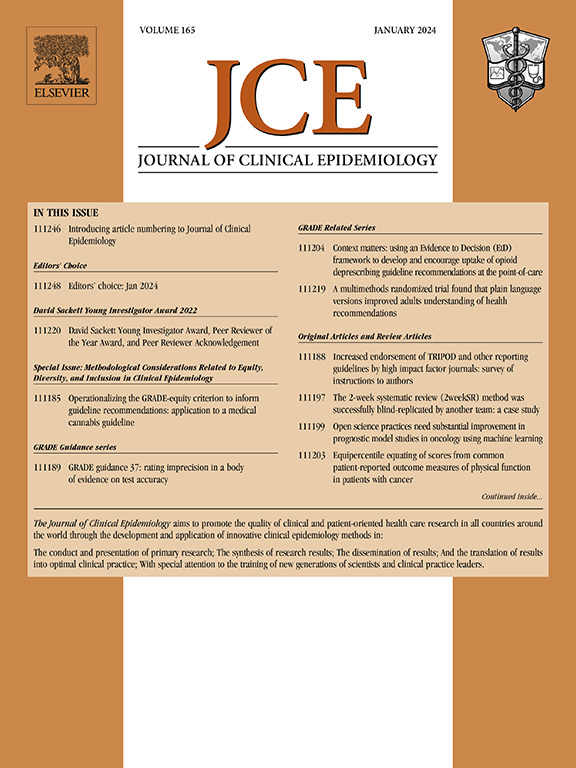Resource use and costs of investigator-sponsored randomized clinical trials in Switzerland, Germany, and the United Kingdom: a metaresearch study
IF 7.3
2区 医学
Q1 HEALTH CARE SCIENCES & SERVICES
引用次数: 0
Abstract
Background and Objectives
Conducting high-quality randomized clinical trials (RCTs) is challenging and resource intensive. Funders and academic investigators depend on limited financial resources and, therefore, need empirical data for optimal budget planning. However, current literature lacks detailed empirical data on resource use and costs of investigator-sponsored RCTs. The aim of this study is to systematically collect cost data from investigator-sponsored RCTs from Switzerland, Germany, and the United Kingdom (UK).
Methods
Principal investigators were asked to share their RCT cost and resource use data and enter it into an online case report form. We assessed cost patterns, cost drivers, and specific cost items, examined costs by study phase (planning-, conduct-, and finalization phase), compared planned with actual RCT costs, and explored differences in cost patterns across countries, medical fields, and intervention types.
Results
We included 93 RCTs which were initiated in Switzerland (n = 53; including eight conducted in low- and lower middle-income countries), Germany (n = 22), and the UK (n = 18). The median total trial cost in our RCT sample was $645,824 [interquartile range (IQR), $269,846–$1,577,924]. The median proportion of the total costs spent for planning phase was 27.5% [IQR, 20.6%–39.7%], for conduct phase 57.3% [IQR, 44.4%–66.3%], and for finalization phase 12.7% [IQR, 8.5%–19.3%] with little variation across countries. The items that contributed most to the total costs were protocol writing (7.2%; IQR 3.8%–10.6%), data management (5.0%; IQR 2.2%–8.1%) and follow-up (4.5%; IQR 2.3%–8.4%). Of the 66 RCTs with an available original budget, 46 (69.7%) exceeded the budget by over 50%. Use of routinely collected data to assess primary outcomes was independently associated with lower per patient- and lower total trial costs.
Conclusion
Over a quarter of total trial costs were incurred in the planning phase, which is typically not fully funded. Two-thirds of RCTs exceeded their budget by more than 50%. Investigators and funders should consider empirical cost data to improve budgeting and funding practices.
瑞士、德国和英国研究者发起的随机临床试验的资源使用和成本:一项元研究。
背景:开展高质量的随机临床试验(RCT)具有挑战性,而且需要大量资源。资助者和学术研究者依赖于有限的财政资源,因此需要经验数据来优化预算规划。然而,目前的文献缺乏关于研究者赞助的 RCT 的资源使用和成本的详细经验数据。本研究旨在系统收集瑞士、德国和英国研究者赞助的 RCT 的成本数据:方法:要求主要研究者分享其 RCT 成本和资源使用数据,并将其输入在线病例报告表。我们评估了成本模式、成本驱动因素和具体成本项目,按研究阶段(计划阶段、实施阶段和最终阶段)检查了成本,比较了RCT的计划成本和实际成本,并探讨了不同国家、医疗领域和干预类型的成本模式差异:我们纳入了 93 项 RCT,这些 RCT 分别在瑞士(53 项,其中 8 项在低收入和中低收入国家进行)、德国(22 项)和英国(18 项)启动。在我们的 RCT 样本中,试验总成本的中位数为 645,824 美元[四分位距 (IQR) 为 269,846 美元至 1,577,924 美元]。总成本中用于计划阶段的比例中位数为 27.5% [IQR,20.6%-39.7%],用于实施阶段的比例中位数为 57.3% [IQR,44.4%-66.3%],用于最终阶段的比例中位数为 12.7% [IQR,8.5%-19.3%],各国之间的差异很小。对总成本贡献最大的项目是方案撰写(7.2%;IQR 3.8%-10.6%)、数据管理(5.0%;IQR 2.2%-8.1%)和随访(4.5%;IQR 2.3%-8.4%)。在 66 项有原始预算的 RCT 中,46 项(69.7%)超出预算 50%以上。使用常规收集的数据评估主要结果与降低每位患者的试验成本和试验总成本有独立关联:结论:超过四分之一的试验总成本发生在计划阶段,而这一阶段的资金通常并不充足。三分之二的 RCT 超过预算 50%以上。研究者和资助者应考虑经验成本数据,以改进预算和资助实践。
本文章由计算机程序翻译,如有差异,请以英文原文为准。
求助全文
约1分钟内获得全文
求助全文
来源期刊

Journal of Clinical Epidemiology
医学-公共卫生、环境卫生与职业卫生
CiteScore
12.00
自引率
6.90%
发文量
320
审稿时长
44 days
期刊介绍:
The Journal of Clinical Epidemiology strives to enhance the quality of clinical and patient-oriented healthcare research by advancing and applying innovative methods in conducting, presenting, synthesizing, disseminating, and translating research results into optimal clinical practice. Special emphasis is placed on training new generations of scientists and clinical practice leaders.
 求助内容:
求助内容: 应助结果提醒方式:
应助结果提醒方式:


